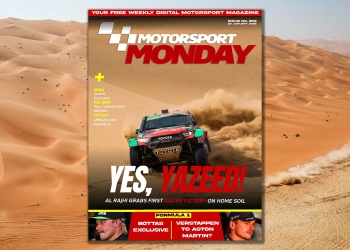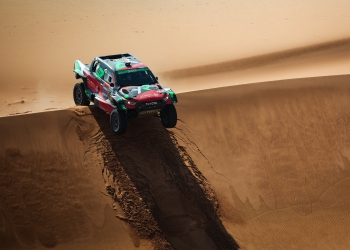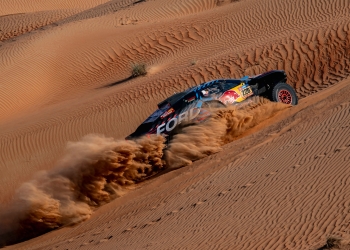Audi has unveiled its brand new RS Q e-tron, which will compete at next year’s famous Dakar Rally in Saudi Arabia.
The electric-powered off-road vehicle, which is 4.5m long and 2.3m wide, features a striking roof scoop which is used to cool the batteries located along the floor and rear of the car.
The powertrain takes inspiration from the German marque’s Formula E and DTM programmes, utilising three MGUs, one on each axle – each capable of producing 250kW of power.
A 2.0-litre TFSI four-cylinder turbo-powered combustion engine, which has a huge 295-litre fuel tank, will be used to recharge the batteries.
A third MGU, of identical design, is part of the energy converter and serves to recharge the high-voltage battery while driving. In addition, energy is recuperated during braking.

As part of weight-saving measures, the e-tron has a small single-gear gearbox on each axle with digital differentials.
Aerodynamics have also been considered with two hidden spare tyres integrated into the bodywork.
Audi hopes the RS Q e-tron can reimagine the Dakar rally, like its quattro did for the World Rally Championship in 1982.
“The quattro was a gamechanger for the World Rally Championship. Audi was the first brand to win the Le Mans 24 Hours with an electrified drivetrain. Now, we want to usher in a new era at the Dakar Rally, while testing and further developing our e-tron technology under extreme conditions,” commented Julius Seebach, Managing Director of Audi Sport GmbH.
Stefan Dreyer, Head of Development at Audi Sport, added: “The battery is also a proprietary development that we have realised together with a partner. As engineers, we basically see development potential in every component. But in terms of the drivetrain system, we have already achieved a system efficiency of over 97 percent in Formula E. There’s not much more room for improvement.
“The situation is quite different with the battery and energy management. This is where the greatest development potential lies in electromobility in general. What we learn from the extremely challenging Dakar project will flow into future production models. As always, we are also working closely with our colleagues from road car development on this project.”










